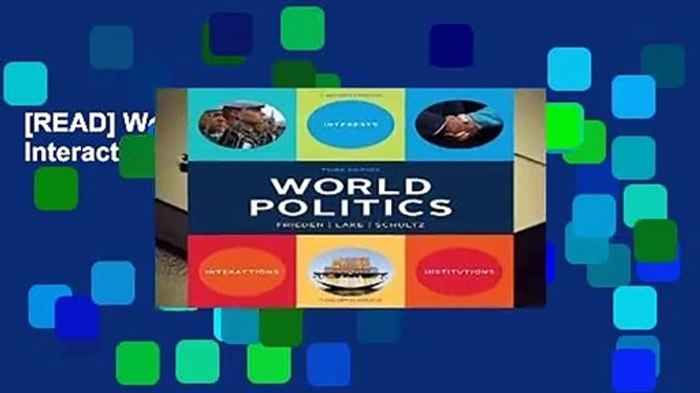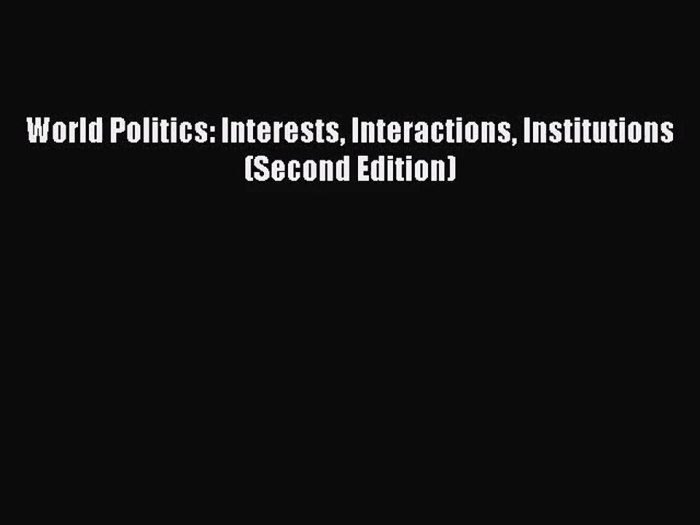World politics interests interactions institutions fifth edition – Welcome to the fifth edition of World Politics: Interests, Interactions, and Institutions. This comprehensive text provides an in-depth exploration of the complex and ever-evolving field of world politics. With its rigorous analysis, insightful perspectives, and engaging writing style, this book offers a thorough understanding of the key concepts, theories, actors, and institutions that shape global affairs.
From the historical evolution of world politics to the contemporary challenges and opportunities facing the international community, this text delves into the intricacies of power dynamics, national interests, and global governance. It examines the roles of states, international organizations, and non-state actors in shaping the global agenda and analyzes the effectiveness of international institutions in facilitating cooperation and managing conflict.
Historical Evolution of World Politics

World politics, as a field of study, emerged in the late 19th century as a response to the increasing interconnectedness and interdependence of nations.
Major events and factors shaping its evolution include the Industrial Revolution, colonialism, the two World Wars, the Cold War, and the rise of globalization.
Key Concepts and Theories
Power:The ability to influence or control the behavior of others.
Sovereignty:The supreme authority of a state within its territory.
National Interest:The goals and objectives that a state pursues in its foreign policy.
Realism:Focuses on the role of power and national interest in international relations.
Liberalism:Emphasizes the role of cooperation, institutions, and international law in promoting peace and prosperity.
Constructivism:Argues that international relations are shaped by social and cultural factors.
Actors in World Politics
- States:The primary actors in world politics, possessing sovereignty and the ability to make and enforce laws.
- International Organizations:Entities created by states to facilitate cooperation and manage conflict, such as the United Nations and the World Bank.
- Non-State Actors:Entities that play a significant role in world politics, such as multinational corporations, NGOs, and terrorist groups.
Institutions and Processes
International Institutions:Facilitate cooperation, manage conflict, and establish norms and rules, such as the United Nations, the World Trade Organization, and the International Court of Justice.
International Processes:Formal and informal mechanisms for states to interact and negotiate, such as diplomacy, summits, and conferences.
Regional Dynamics
- Europe:Highly integrated region with a history of cooperation and conflict.
- Asia:Rising economic and political power, with diverse regional dynamics.
- Middle East:Complex region with ongoing political and security challenges.
Global Issues
- Climate Change:The impact of human activities on the Earth’s climate, posing significant challenges.
- Terrorism:The use of violence to achieve political or religious goals, a major threat to global security.
- Nuclear Proliferation:The spread of nuclear weapons and the potential for their use.
The Future of World Politics, World politics interests interactions institutions fifth edition
The future of world politics is uncertain, with potential scenarios including:
- Continued Global Cooperation:States work together to address global challenges.
- Rising Nationalism and Populism:States prioritize their own interests and retreat from international cooperation.
- A Multipolar World:Power is distributed among several major powers, leading to increased competition and instability.
FAQ Insights: World Politics Interests Interactions Institutions Fifth Edition
What is the main focus of world politics?
World politics focuses on the interactions between states and other actors in the international system, examining issues of power, security, and cooperation.
What are the key theories used in world politics?
Realism, liberalism, and constructivism are the main theoretical approaches used to understand world politics, each offering different perspectives on the nature of international relations.
What are the major challenges facing world politics today?
Climate change, terrorism, nuclear proliferation, and global economic inequality are among the pressing challenges facing the international community.
